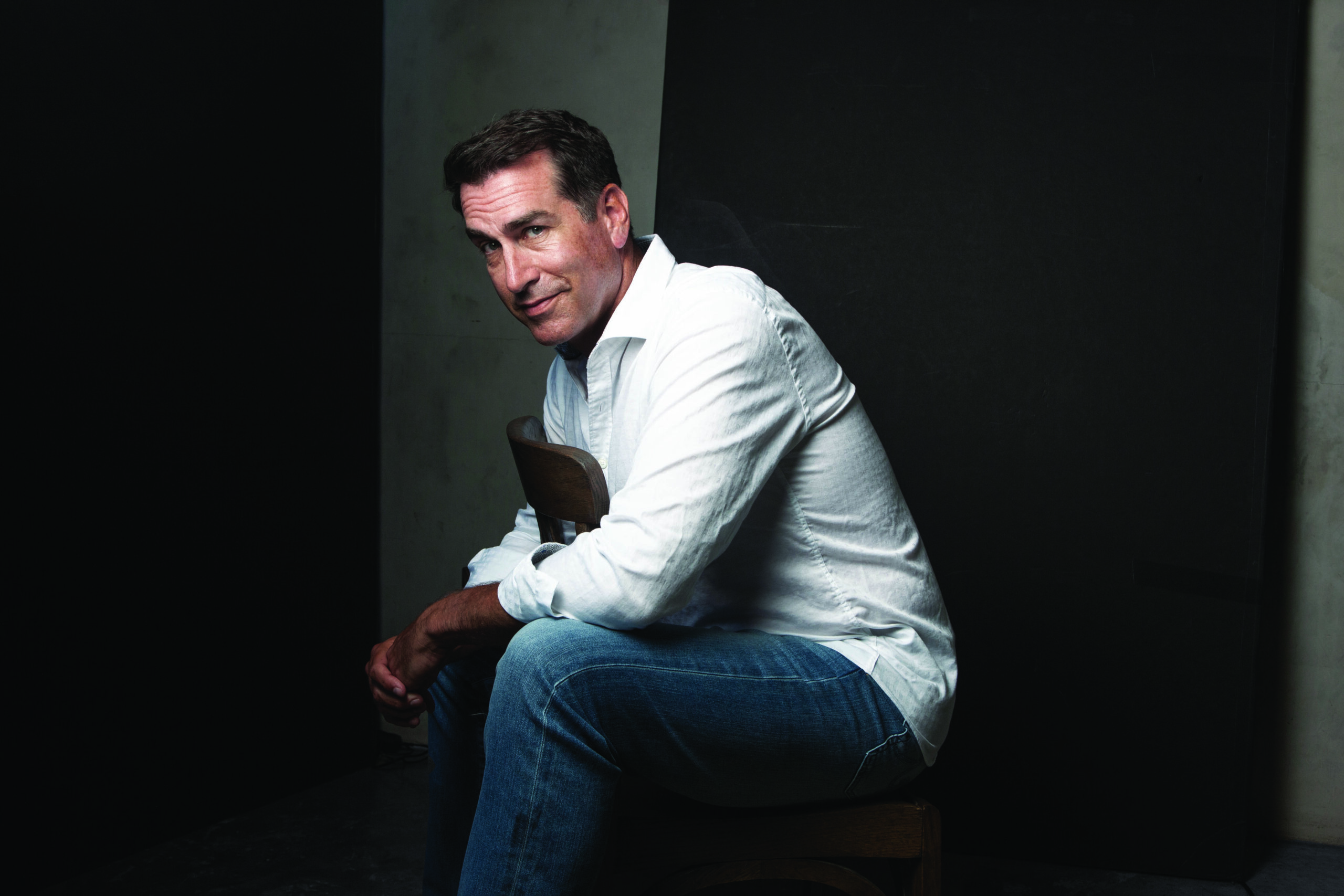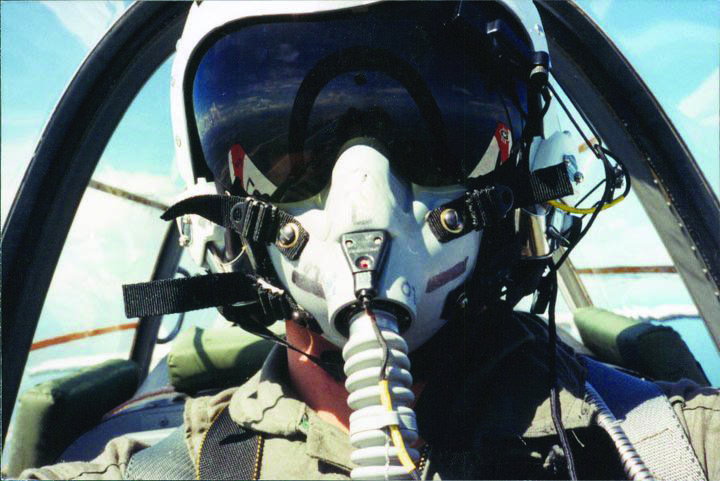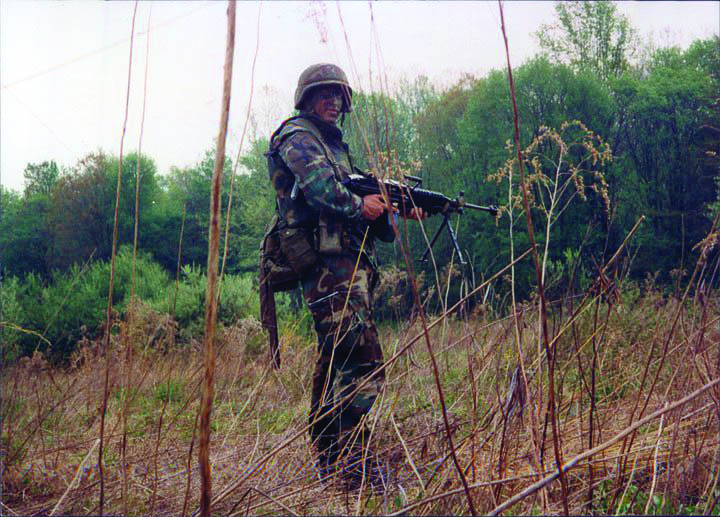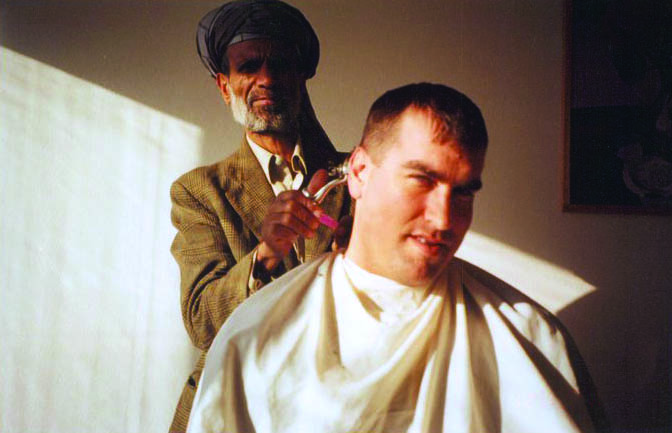
From Corps to Comedy
By: Joel SearlsPosted on September 15, 2024
More than likely, you’ve seen comedian and actor Rob Riggle on TV. He’s appeared on “The Daily Show,” “Saturday Night Live,” “The Simpson’s” and “Modern Family.” He’s been in films like “Talladega Nights: The Ballad of Ricky Bobby,” “The Hangover,” and “Step Brothers.”
Riggle also had a 23-year career in the Marine Corps, retiring as lieutenant colonel. Between 1990 and 2013, he was a public affairs officer and a civil affairs officer and he deployed to numerous places around the globe, including Afghanistan, Albania, Liberia and Kosovo.
“The beautiful thing about being an American is you can have as many dreams as you want,” said Riggle. “If you go after your dreams, there is no limit to what you can pursue.”
People often seem puzzled by Riggle’s Marine Corps background, telling him that seems an unlikely beginning for a career in making people laugh. “Some of the funniest people I ever met were in the Marine Corps,” said Riggle.
“A profound sense of patriotism” led Rob Riggle to join the Marine Corps at age 19. Though he was not the first in his family to serve—his grandfather served in the 8th Air Force in World War II and his uncle served in the Army during the Vietnam War—he was the first to become a Marine.
The Corps served as a bridge for Riggle to make the transition from “boyhood to manhood.” The Marine Corps showed him he was “capable of a lot more than [he thought he] was.” He was shown that his limits were “way beyond” what he had perceived. Once his mind processed the newfound standards of the Corps, what he demanded of himself “went up,” and he thought to himself,
“Maybe I should try these dreams that seem too crazy to try; maybe I should try it.” He said he was doubtful at first about pursuing comedy because he didn’t know anyone in the industry. No surprise, everyone around him thought he was crazy, but Riggle had a new “sense of belief in himself” that, “if I applied myself, I could do anything.”
Riggle initially planned to pursue a career as a naval aviator in the Corps so he earned his private pilot’s license while he was an undergraduate at the University of Kansas. Being voted “Most Humorous” in high school ignited his desire to work in comedy, so his degree was in theater and film. After graduation, he was commissioned and went to The Basic School in Quantico, Va. When he was ready to go to Naval Air Station (NAS) Pensacola, Fla., for flight training, he discovered the pipeline was clogged—there would be a delay to get trained as a pilot. In the meantime, the Corps sent him to be an Assistant Officer Selection Officer and recruit Marines in Kansas City. He did OSO duty for a few months, then reported to Pensacola.

Again, NAS Pensacola was backed up on student pilots. The Corps said, “Find a job,” so he and his roommates ended up training Saudi Arabian flight school students in entry-level piloting while waiting to start their own training. They trained their students in meteorology, engines and physical fitness. They taught them how to swim and get comfortable in the water. After that, Riggle completed his first phase of flight training and was sent to Corpus Christi, Texas, for further instruction.
While at Intermediate Flight Training in Corpus Christi, Riggle experienced what he calls his “quarter-life crisis.” He had to choose whether to pursue being a pilot and staying in for nearly 10 years on a flight contract or going a different route, with a three-year contract and the goal of getting out to pursue comedy. The burning question in his soul was, “Can I be an actor?”
He mulled it over for months before realizing he could “live with the failure better than the not knowing.” Riggle made his decision after much thought and prayer out on the beach in Corpus Christi. He knew what he wanted; he wanted to act.
From the mid-1990s until his big break in 2004 on “Saturday Night Live,” Riggle had multiple day jobs, late nights of writing and performing, and an endless marathon of obstacles to overcome. Around 2000, Riggle transitioned from active duty to the Marine Corps reserves.
He admits that he “sincerely thought about quitting,” after having given acting and comedy a true shot. The truth was, he had responsibilities. Riggle said he had “tough moments” and, “just like a long hike in the Corps, [he] just kept going.” He considers himself “very lucky and blessed to have stayed in it just a little longer.”
He auditioned for a TV pilot for Comedy Central, “The Jim Breuer Show” and did rehearsals at night while still on active-duty during the day. He took leave when they filmed the pilot. Unfortunately, the pilot did not get picked up, but the experience showed Riggle that he could “get gigs” and was “on the right path.” He deployed to Kosovo but was back in Manhattan with MTU-17 when the 9/11 terrorist attacks happened.
MTU-17 was activated, and he was in his utilities at Ground Zero the next day. He worked on the rubble piles in the bucket brigade as part of the rescue efforts. He volunteered to go back on active duty. He said that, during that period, “everybody wanted to contribute. Everybody wanted to do something.” He remembered people bringing boxes of clothes and lines for blood donations going around the block. He said, “As a captain in the Marine Corps I could contribute right away.”

Riggle got orders on Nov. 10, 2001, to go to U.S. Central Command (CENTCOM). He reported on Nov. 17 and was on a plane to Afghanistan on Nov. 30. He served in the public affairs section for CENTCOM under LtCol Max Bowers, who commanded the 3rd Battalion, 5th Special Forces Group and was later highlighted in the book and film “12 Strong“; Riggle portrayed Bowers in the feature film. In real life, Riggle joined the unit right after they took Mazar-i-Sharif. While on the staff, he served alongside a military attorney and an Army civil affairs team, and he was moved into a civil affairs billet.
Riggle took a tactical pause in the spring of 2004 when he had a chance for a big corporate job that paid well and the opportunity to own a home after living in “rinky-dink” apartments in New York City. In the summer of 2004, the invitation only call came for him to audition for “Saturday Night Live.” The program hired only one new person for the show that year: Riggle.
Riggle got the call from producer Lorne Michaels nearly 10 years to the day after which he wrote in the back of a book, “I’m going to get on Saturday Night Live.” Riggle said, “It took 10 years, two wars, a marriage, and a kid … there were so many things on that path … and the next 10 years [were] all a grind.”
After SNL, Riggle went to “The Daily Show,” where he said he had a “good run” on the program and found more work through his time on it. He learned a very valuable lesson about show business: “There is no time to relax. It is always a competition … even for the Brad Pitts and Leos of the world; they still compete for the best scripts and the best projects. It is always a competition and a final exam … If you deliver on your most recent opportunity, maybe you get another one.” He said there are “no guarantees and no promises.” When you “eat what you kill,” he emphasized, “you have to hook and jab every single day.” Riggle shared key wisdom, too, saying, “If you are a working actor, consider yourself a success … If it’s your purpose and your passion, you can’t do anything else.”

The Marine Corps and acting have taken this Midwest native all over the country and the world. During most of his deployments he was assigned a billet in civil affairs to go along with his public affairs leadership position. In Afghanistan, he was out having lunch with mullahs, talking about helping the local civil populace by building them a school or drainage ditch. Riggle also served with the Red Cross, and his Marines ensured safety for the Red Cross to engage with the civil populace. He said, “I would have to meet [the Afghan civilians] out in the street, as they didn’t want the Marines to have their weapons with them … “If I don’t have my weapon then we won’t be having the meeting … I’m not going anywhere without that sucker.”
Riggle reiterates that the, “leadership lessons learned in the Corps … JJDIDTIEBUCKLE … those fundamentals, they stick. They didn’t just fall out of the sky [and they’re not just] cliche, they are effective. They work.” He further elaborates with, “ ‘Warfighting,’ that document … you can take that and apply it to almost every facet of your life and find success. Take it. Apply it to whatever you are doing, and you will likely find more success.”
Riggle said the things he misses most about the Corps are “the integrity, the discipline … the getting up early and going for a run … doing what Marines do … the fraternity, the brotherhood. It was always an honor to be part of that organization. I treasure it. I don’t take it for granted.”
He said that “service” will always be “part of who he is.”
Riggle’s Marine Corps experience also guides his volunteer and philanthropy efforts; he created a charity in Kansas City for the Children’s Emergency Hospital, which is going into its 15th. He works with the Semper Fi and America’s Fund, and he has even done charitable efforts for the Tunnels to Towers Foundation and Pat Tillman Foundation. Riggle recently competed in a charity poker tournament for the Special Olympics for kids and used to run a gold tournament called the InVETational with We Are The Mighty and the Semper Fi and America’s Fund. Bob Parsons, a fellow Marine, decorated Vietnam veteran, founder of multiple companies including GoDaddy and PXG (see the interview with Parsons in the October 2022 issue of Leatherneck), was a big supporter of the InVETational and whatever Riggle raised, Parsons matched.
Riggle takes great pride in his service and still considers honor, courage and commitment his guiding principles. And when he writes out his goals for each year, he also writes down his Corps values. He references those values “every day … it becomes part of your fabric and who you are.”
Riggle said that in addition to feeling pride about his time in the Corps, he is forever grateful to the Corps for “taking [him] from boyhood to manhood” and giving him the opportunity to become a leader. Serving and leading Marines “… is the greatest honor I’ve ever had,” said Riggle. He said he plans to lead and give back “until the day I die.”
Author’s bio: Joel Searls is a journalist, writer, and creative who serves as a major in civil affairs and COMMSTRAT in the Marine Corps Reserve. He has completed the Writer’s Guild Foundation Veterans Writing Project, is a produced playwright, a commission screenwriter, and an entertainment consultant. His most recent feature film-producing project is “Running with the Devil.” He is a graduate of The Ohio State University.




